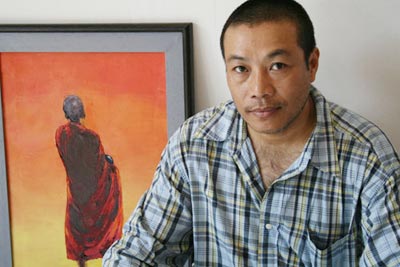
| By LAWI WENG | Wednesday, April 28, 2010 |
Harn Lay, The Irrawaddy's illustrator and cartoonist, has received a Hellman/Hammett grant for his political cartoons and art penned against the Burmese regime.
Marcia Allina, the coordinator of the grant program for Human Rights Watch based in New York City, told The Irrawaddy that Harn Lay was selected without debate by the selection committee, made up of widely respected writers and editors.
 |
| Cartoonist Harn Lay (Photo: Moe Kyaw/The Irrawaddy) |
“I assume it was because the message [his art] is so clear, and he qualified as a persecuted person because he had to flee for his personal safety. He is a perfect example of someone who was targeted for expressing ideas that the government wanted to suppress,” she said.
The recognition comes with a grant, which ranges from $500 to $10,000.
Harn Lay, 44, an ethnic Shan artist, graduated from the Rangoon School of Fine Arts Academy. He is based in Chiang Mai in northern Thailand, and he is well-known for his political cartoons.
Burmese politics made him a cartoonist, Harn Lay said. He fled to Thailand following Burma's pro-democracy uprising in 1988.
Harn Lay has specialized in satirizing Snr-Gen Than Shwe, the head of the Burmese military. His work appears in The Irrawaddy online website and in the monthly print magazine, where he frequently illustrates magazine cover stories and articles. He also exhibits fine art oil paintings, most often in portraiture and landscapes.
“To me, art is for impression and cartoons are for expression,” said Harn Lay. “I am very proud when my work is recognized because in its own way it fights for human rights. The Burmese people are starved for human rights. We were born with human rights, and we want our rights back as soon as possible.”
Human Rights Watch administers the Hellman/Hammett grants, awarded to writers and artists around the world who have been targets of political persecution. The grant program began in 1989 when the popular American playwrite Hellman set aside part of her estate to be used to assist writers in financial need as a result of their expression of dissenting views.
Her companion, novelist Dashiell Hammett, was the author of The Maltese Falcon and other books. They were staunch advocates of freedom of expression, and both stood up against a US congressional committee in the 1950s that was engaged in “a witch hunt” to expose people who were allegedly Communist sympathizers.
Allina said, “The grant is meant to support and defend free expression, especially in opposition to government efforts to suppress and control human rights. Our message to the Burmese people is have courage...and that people around the world care.”
There is no freedom of expression in Burma, where the regime censors media. The regime has arrested journalists, writers, bloggers, photographers, politicians and others and sentenced them to long prison terms for criticizing or exposing their actions. There are more than 2,100 political prisoners in Burma.
Over the past 20 years, more than 700 writers from 93 countries have received Hellman/Hammett grants, including Burmese writers and democracy activists such as Tin Moe, Saw Wai, Tun Aung, bloggers Nay Phone Latt, Zarganar, and the Burmese human rights defender Bo Kyi, the co-director of the Assistance Association for Political Prisoners-Burma.